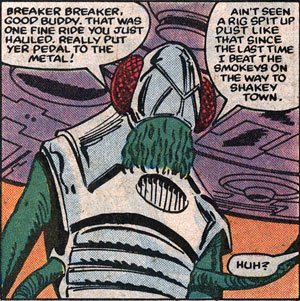

Because police would also listen to the CB radio channels, the trucker drivers developed an elaborate slang including code names called handles to protect their identities.

Convoys would also tell each other where police officers set up speed traps, if there was a roadside emergency, or even block off roads with their trucks in protest. Convoys were groups of truckers that drove together down highways faster than the speed limit because the police couldn’t catch all of them. This, among other regulations, angered truckers who then used their CB radios to form convoys. Trucker drivers also began to using CB radio to communicate, especially after the United States enforced a nationwide 55 mph speed limit during the oil crisis of 1973. CB radio was used for everything from small businesses communicating with employees to hobbyists just looking for entertainment. People were excited to have a platform that would connect them to strangers all over the nation for practical and personal uses. CB radio caught on the same way social media and online communication does today. For these reasons CB radio become incredibly popular in the 1970’s.

Although the story in the song is fictional, it is inspired by real protests and the CB radio fad.ĬB radio was a relatively cheap radio that, unlike amateur radio, could be used by anyone without a license. It is about a fictional group of truckers that organize a protest over Citizen’s Band (CB) radio using their own made up code words. McCall is one of the most interesting songs in all of country music because of its defiant, unique story.


 0 kommentar(er)
0 kommentar(er)
